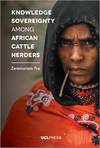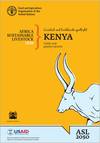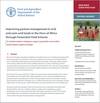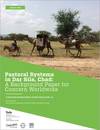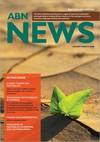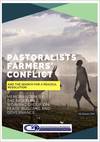Beni-Amer cattle owners in the western part of the Horn of Africa are not only masters in cattle breeding, they are also knowledge sovereign, in terms of owning productive genes of cattle and the cognitive knowledge base crucial to sustainable development.
In this book, the first to study Beni-Amer practices, Zeremariam Fre argues for the importance of their knowledge, challenging the preconceptions that regard it as untrustworthy when compared to scientific knowledge from more developed regions.
Empirical evidence suggests that there is much one could learn from the other, since elements of pastoralist technology, such as those related to animal production and husbandry, make a direct contribution to our knowledge of livestock production.Fre also argues that indigenous knowledge can be viewed as a stand-alone science, and that a community’s rights over ownership should be defended by government officials, development planners and policy makers, making the case for a celebration of the knowledge sovereignty of pastoralist communities.
Year of publication: 2018Organization: Индивидуальные авторы
Topic: Коренные знания
Language: English
Type of document: Технический
Geographical coverage: Восточная Африка
In this brief, the Africa Sustainable Livestock 2050 summarises the contribution of cattle and poultry to household livelihoods, based on available information, including government and research reports and papers. Pastoralism as a production system is highlighted given that livestock are a popular asset in Kenya and a major contributor to household livelihoods, both in terms of income as well as food.
Year of publication: 2018Organization: Продовольственная и сельскохозяйственная организация Объединенных Наций
Topic: Продовольственная безопасность
Language: English
Type of document: Технический
Geographical coverage: Восточная Африка
Recurrent drought, degraded rangelands and reduced access to traditional grazing lands have left pastoral communities in the Horn of Africa’s arid and semi-arid lands (ASALs) more vulnerable and facing severe livestock feed shortages. During dry spells, pastoral communities suffer from food and nutrition insecurity, as well as shrinking incomes occasioned by livestock losses and reduced livestock production. Climate change adds an extra layer of vulnerability to this already fragile ecosystem, exacerbating the underlying causes of poverty and food insecurity.During the past two decades, FAO and its partners have conducted Pastoralist Field Schools (PFS) in the Horn of Africa’s ASALs to address this challenging context. Specifically, this document describes how their recent experiences with PFS in Kenya and Ethiopia have contributed to restoring the livelihoods of livestock-dependent communities through improved pasture management.
Year of publication: 2018Organization: Продовольственная и сельскохозяйственная организация Объединенных Наций
Topic: Изменение климата, Продовольственная безопасность, Быстрая восстанавливаемость
Language: English
Type of document: Технический
Geographical coverage: Восточная Африка
The study contributes to the understanding of the dynamics of pastoralism and farming in Dar Sila in relation to its natural, social, and economic environment. The authors review the history of the development of pastoralism in Chad, look closely at pastoral systems in eastern Chad, review the policy and institutional context for pastoralism in Chad, and offer recommendations for practitioners working with pastoralist communities in Dar Sila and nationally in Chad.
Year of publication: 2018Organization:
Topic: Быстрая восстанавливаемость
Language: English
Type of document: Технический
Geographical coverage: Западная Африка
Pastoralism as a concept continues to be misunderstood with pastoralists often on the receiving end of government marginalisation and harassment. This edition of the African Biodiversity Network newsletter addresses the challenges faced by pastoralists in the region and sheds light on the benefits of pastoralism at the community and national level. It highlights the relationship between climate change and pastoralism, and showcases the plight of pastoralists in Tanzania through a case study. It also addresses the broader challenges faced by pastoralists in Eastern and Southern Africa like forceful evictions.
Year of publication: 2018Organization: Индивидуальные авторы
Topic: Изменение климата, Коренные народы, Земля, Быстрая восстанавливаемость
Language: English
Type of document: Рассылки
Geographical coverage: Восточная Африка
Pastoralists-farmers’ conflicts in Nigeria have grown, spread and intensified over the past decade and today pose a threat to national survival. Each day, there are more revenge killings, in retaliation for previous killings, which are making the possibilities of peaceful resolution more difficult. Rural banditry is becoming the norm in the Nigerian hinterland and has been transformed into a vicious criminal activity. The result is that the scale of loss of both herds and human life has been escalating and the victims are on all sides – subsistence farmers, commercial farmers and pastoralists. This memorandum was written in an attempt to get stakeholders to pause, reflect and seek a way out of the pastoralists-farmers’ conflict in Nigeria.
Year of publication: 2018Organization: Индивидуальные авторы
Topic: Конфликт
Language: English
Type of document: Технический
Geographical coverage: Западная Африка
Change in climate and climate extremes are acknowledged as a vital challenge to pastoral production systems. Alternative systems that are accessible to a household in order to make a living could determine the household’s resilience at a given point in time. This study was conducted in the Southern Afar region in Ethiopia to understand the resilience of pastoralists to climate change and variability.
Year of publication: 2018Organization: Индивидуальные авторы
Topic: Изменение климата, Быстрая восстанавливаемость
Language: English
Type of document: Технический
Geographical coverage: Восточная Африка
Pratiqué par des populations vivant sur les parcours et exploitant des troupeaux d’herbivores domestiques, le pastoralisme est une activité agricole de production, une forme d'élevage extensif, qui suppose un rapport étroit entre l'espace pastoral, les hommes qui y vivent et les troupeaux qu'ils exploitent. Quelles que soient les régions du monde le concernant, les animaux conduits sur un mode extensif utilisent les ressources de la végétation naturelle, mais aussi d’autres ressources, fourrages ou aliments concentrés, associées à ce système alimentaire dominant
Year of publication: 2018Organization: Международный центр по перспективным агрономическим исследованиям в регионе Средиземноморья
Topic: Продовольственная безопасность
Language: Français
Type of document: Технический
Geographical coverage: Глобальный


